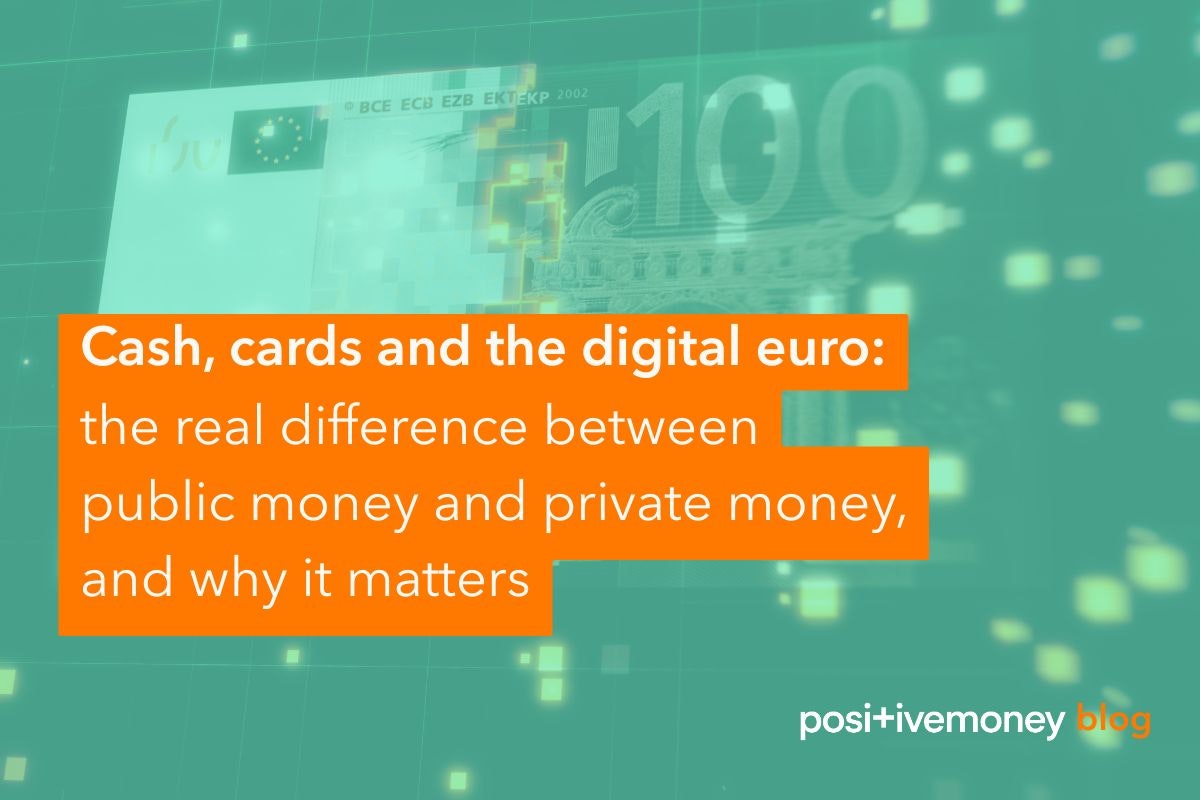
The future of moneyEU
10 September 2025
Money is a public good, something most of us use every day, and everyone should have access to.
Cash is the most liquid and safe asset that people have access to in the economy today. Why? Because it’s public money backed by the state. The money in our bank account, however, is private bank money. Bank deposits are backed by private banks, which can, and do, go bankrupt. The reason we trust private bank money is because we know that we can instantly convert our bank deposits into cash when needed. We also trust that the state will safeguard our deposits during a banking crisis. Maintaining access to cash is therefore crucial to maintaining trust in our monetary system. Cash is also important for people who are not digitally savvy, and for those concerned about privacy, as it is the most anonymous form of money.
Today, cash constitutes 14% of the money in circulation in the real economy. The decline of cash is partly due to increased digitalisation – think of online shopping – but also because banks are closing ATMs and merchants are limiting the acceptance of cash. So, is cash going to disappear? Not if we can help it. The European Commission has committed to protecting cash for as long as possible, and we strongly support this initiative.
But even if we protect access to cash, we will still become increasingly reliant on private banks and card companies for online digital payments. This reliance on banks for digital payments ultimately leads to large numbers of people being financially excluded, and it means even more transfer of personal data into the hands of profit-making companies. Moreover, it would mean reinforcing a system where we need to rescue banks with taxpayers money every time they get into trouble, because they manage the quantity of money in circulation and our payment infrastructure.
For these reasons, we support the European Central Bank’s development of a central bank digital currency that would act as the digital equivalent of cash – the digital euro.
The digital euro is a universally accessible and safe electronic form of public money – it is a way to ensure that people have access to public money in an increasingly digital world. Because it is public money, it needs to be designed for the benefit of people and society, and not solely with the interests of the financial sector in mind. A digital euro should have similar benefits to cash today, and it should be easily usable for people. For these reasons, the digital euro must:
1. Be free of costs for its users – The European Commission is proposing free core digital euro services: individual payments and direct debits, as well as online and offline transactions. This would include free account setup, maintenance and basic payment tools, such as cards.
2. Have a high level of privacy – For enhancing trust, the digital euro needs strong privacy, especially for small payments. It should aim for cash-like privacy in low-value payments and offline transactions. Regulation should remain flexible on the technology to enable future advancements.
3. Be accessible through public or nonprofit intermediaries – The digital euro is a public good and should therefore be accessible through public or nonprofit intermediaries, such as public banks, postal networks, and local administrations.
4. Have no or very high holding limits – The digital euro must be usable for people. Limits restrict its everyday use. For instance, a €3,000 cap wouldn’t cover an apartment deposit, and for some people, it wouldn’t be able to hold their salaries. We need a system that works for everyone.
The future of money is at stake. Private banks have every interest in maintaining their monopoly market power over digital money and payments. They are running lobbying campaigns targeting European institutions to undermine the digital euro’s potential. So we have to fight back and make the case that the digital euro is an opportunity to improve our money system, making it safer and more accessible for everyone.